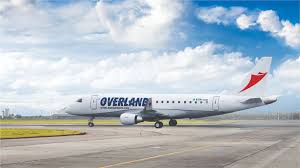Nigeria’s aviation industry is facing growing concern over the failure of the Federal Airports Authority of Nigeria to insure airports across the country, coupled with deteriorating aerodrome infrastructure that continues to harm airline operations.
The alarm was raised by the founder and Chief Executive Officer of Overland Airways, Captain Edward Boyo, during the 5th CHINET Aviacargo Conference at the 21st Akwaaba African Travel Market in Lagos.
Boyo lamented that critical airport facilities remain uninsured, leaving airlines vulnerable to significant risks and losses. He cited persistent infrastructural failures, including inadequate wildlife control, poorly maintained runways, and insufficient derubberization, which have repeatedly caused aircraft damage.
“These infrastructures are not insured. The government would have to meet its own responsibility,” Boyo said, urging the National Insurance Commission to collaborate with relevant authorities to enforce comprehensive airport insurance.
Responding to Boyo’s concerns, the Commissioner for Insurance and Chief Executive Officer of NAICOM, Olusegun Omosehin, represented by Deputy Commissioner (Insurance Technical), Usman Jankara, assured stakeholders that the commission is willing to engage government authorities on the issue.
Jankara stressed that compulsory insurance plays a vital role in protecting public interest and safeguarding economic stability. He explained that NAICOM requires insurers to exhaust local capacity before resorting to reinsurance abroad, ensuring that Nigerian insurers remain active participants in covering domestic risks.
“The underlying rationale for compulsory insurance is to protect members of the public from harm. We are now insisting on very sound underwriting practices. Insurers are in business to make profits, not losses. Paying the right premium ensures that claims are settled when risks materialize,” Jankara said.
He also highlighted reforms to eliminate contract uncertainties, insisting that all insurance policies must be clear on terms and conditions so that policyholders understand their obligations and benefits.
Adding her voice, the Managing Director and Chief Executive Officer of PeakThrust Insurance Brokers Limited, Bimbo Onakomaiya, underscored the necessity of synergy between the aviation and insurance industries.
Nigeria, she revealed, has about 370 registered aircraft—147 with the Nigerian Air Force and around 170 in domestic commercial and private use. According to her, such a large fleet cannot thrive without robust insurance coverage.
“There is no way Nigeria would have such a high fleet without having a very strong insurance backing. Aviation cannot function without insurance. What insurers do is cover risks and promote business confidence,” Onakomaiya noted.
She stressed that under the new Nigerian Insurance Industry Reform Act 2025, collaboration is even more critical, given emerging risks such as piracy in aviation logistics and the growing demand for human capital coverage. This includes group life and personal accident insurance for pilots, engineers, and other aviation personnel.
“Emerging synergies will enhance safety and deepen Nigeria’s ability to compete in the global aviation industry,” she added.
Stakeholders at the conference agreed that the aviation sector cannot operate in isolation. While airlines must maintain their fleets and meet passenger expectations, government agencies such as FAAN must ensure that airports are adequately insured and maintained.
Analysts warn that without adequate insurance, the financial burden of accidents or infrastructure-related damages falls disproportionately on airlines, increasing operational risks and discouraging investment in the sector.
For Boyo and other operators, FAAN’s failure to provide insurance coverage for airports contradicts international best practices, where airport insurance is considered a non-negotiable aspect of aviation safety.
As Nigeria pushes to modernise its aviation sector, the consensus is clear: collaboration between regulators, insurers, and operators is essential. With NAICOM pledging to enforce sound underwriting and stakeholders pushing for compulsory airport insurance, the industry may be on the path to greater security and resilience.
For now, the message from experts remains the same—Nigeria’s aviation future depends on proactive government action, stronger insurance frameworks, and unwavering commitment to safeguarding public interest.















